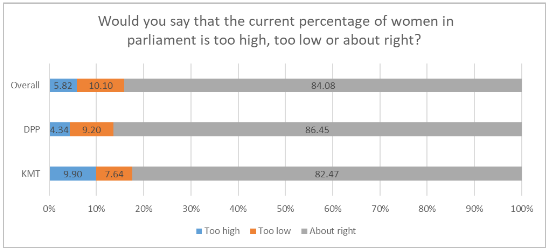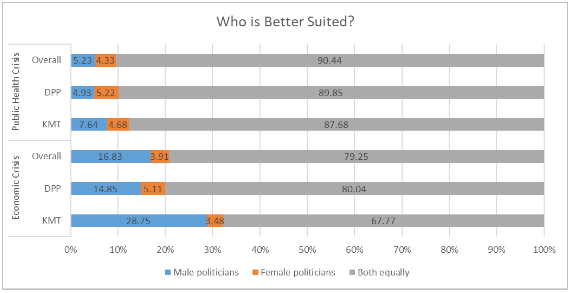Written by Timothy S. Rich, Madelynn Einhorn, and Isabel Eliassen.
Image credit: 總統為「國際同濟會台灣總會第47屆全國年會」錄製致詞影片 by 總統府/Flickr, license CC BY 2.0
Taiwan’s efforts at gender parity for electoral offices have resulted in a legislature where women currently hold 41.6% of seats. This leaves Taiwan ranked 12th globally, with only one Asian country (Timor-Leste) with similar rates. However, despite the success of President Tsai Ing-wen, the vast majority of executive offices (mayors and magistrates) are still held by men. Gender equality and the rise of women in national politics are common narratives when discussing Taiwanese politics. Still, we ask to what extent this translates to public views of women in politics.
Gender quotas have played a key role in Taiwan. The 1946 Republic of China Constitution implemented gender quotas, with national and lower-level quotas increasing over time and with both the Democratic Progressive Party (DPP) and Kuomintang (KMT) initiating candidate quotas. In Taiwan, gender quotas often help women get their start in politics, for example, in city councils, after which they can succeed in bigger political races without gender quotas. Yet, gender quotas rarely lead to actual gender parity and in many countries end up functioning as a ceiling or generating a backlash. As one-party activist in Argentina said, “quotas give women presence, but they do not give them power.”
Even if parties and the public do not explicitly treat female politicians differently, research finds that speeches commonly are evaluated differently based on the gender of the speaker, on gender roles and leadership traits and gender stereotypes about qualifications. In addition, female appointments to secretary or ministerial positions often follow gender norms, with women assigned to areas such as family or labour and rarely finance or military, potentially reinforcing views of who is more suited for certain policy areas. Meanwhile, when interviewing female politicians, media outlets may often ask them questions about their family life or clothing choices, while male politicians are asked about policy. This unequal treatment of women politicians may affect how voters perceive them.
Limited experimental research suggests that the Taiwanese public does not have different expectations for hypothetical male versus female candidates. Moreover, one may expect that greater familiarity with women in executive power due to Tsai Ing-wen’s 2016 and 2020 election victories would assuage latent concerns among some about female leadership. In addition, recent examples of women in traditionally male-dominant positions, such as Wang Mei-Hua as Minister of Economic Affairs, would also suggest greater familiarity if not approved for women in executive positions.
For greater insight, we analyze recently released data from Taiwan’s Election and Democratization Study (TEDS2021) as it directly asks three interrelated questions about gender and politics.
First, the survey asks, “The current percentage of women in parliament after the most recent election is 41.6%. Would you say that the current percentage of women in parliament is too high, too low or about right?”
Here, we find the vast majority say this number is about right (84.08%), with less than 6% claiming that it is too high. When evaluating supporters of the two largest parties, we again see over 80% of DPP and KMT supporters say the percentage is about right. However, nearly one in ten KMT supporters claimed the percentage was too high, compared to less than five per cent of DPP supporters.

The following two questions focus on leadership during crises.
What do you think: Who is better suited for political leadership during a public health crisis: male politicians, female politicians, or both equally?
And who is better suited for political leaders during an economic crisis?
Starting with a public health crisis, see roughly 90% overall and among DPP and KMT respondents say both are equally suited, rates that are likely shaped by the current handling of the COVID-19 pandemic. However, a noticeable dip is evident when the crisis shifts to an economic one. Again, clear majorities say both male and female politicians are equally suited to handle an economic crisis. Still, the percentage stating males are more suited is three times higher or more overall, with the same pattern and across both partisan groups. Surprisingly, there was little difference between male and female respondents, with men only approximately 1% more likely to select that a man is more desirable in handling a crisis than women.

Admittedly, the order of the survey questions may understate the gendered disparity in response between public health crisis and economic crisis. For example, asking who is better suited for handling an economic crisis came directly after the question about a public health crisis. This meant many respondents who selected “both equally” for the first question might feel uncomfortable selecting a perceived socially undesirable answer for the second question.
The results suggest that familiarity with women in politics and leadership positions influences views, but with some hesitancy to treat women as equally qualified for crises in which Taiwanese have not already seen women in a position of power. In Taiwan, many women have held ministerial positions relating to economics or finance. Still, this development is somewhat recent, so the lack of faith in female politicians’ abilities to handle an economic crisis may abate over time if women continue to accept and succeed in these roles. However, while it is easy to stand for gender equality in a survey, implicit bias that shapes voter’s perceptions of candidates may continue acting as a hurdle in Taiwanese politics.
Timothy S. Rich is an associate professor of political science at Western Kentucky University and director of the International Public Opinion Lab (IPOL).
Madelynn Einhorn is an honour undergraduate researcher at Western Kentucky University, majoring in Political Science and Economics.
Isabel Eliassen is a 2021 honours graduate of Western Kentucky University. She triple majored in International Affairs, Chinese, and Linguistics.

